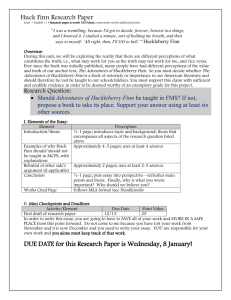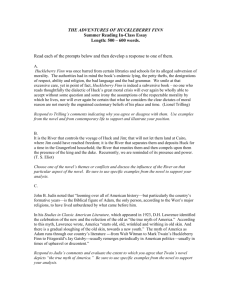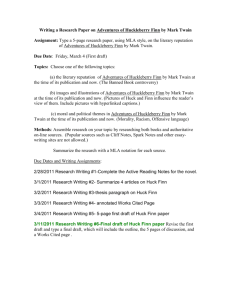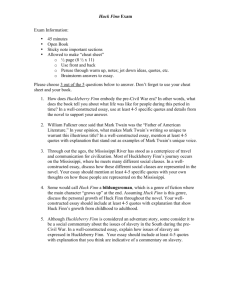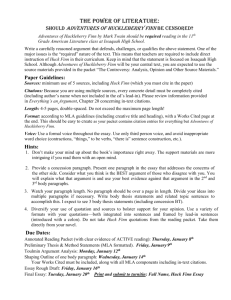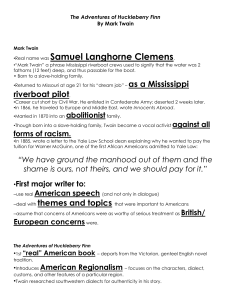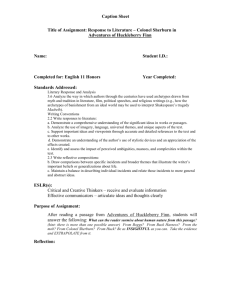Consequences of Moral Choices in Huckleberry Finn
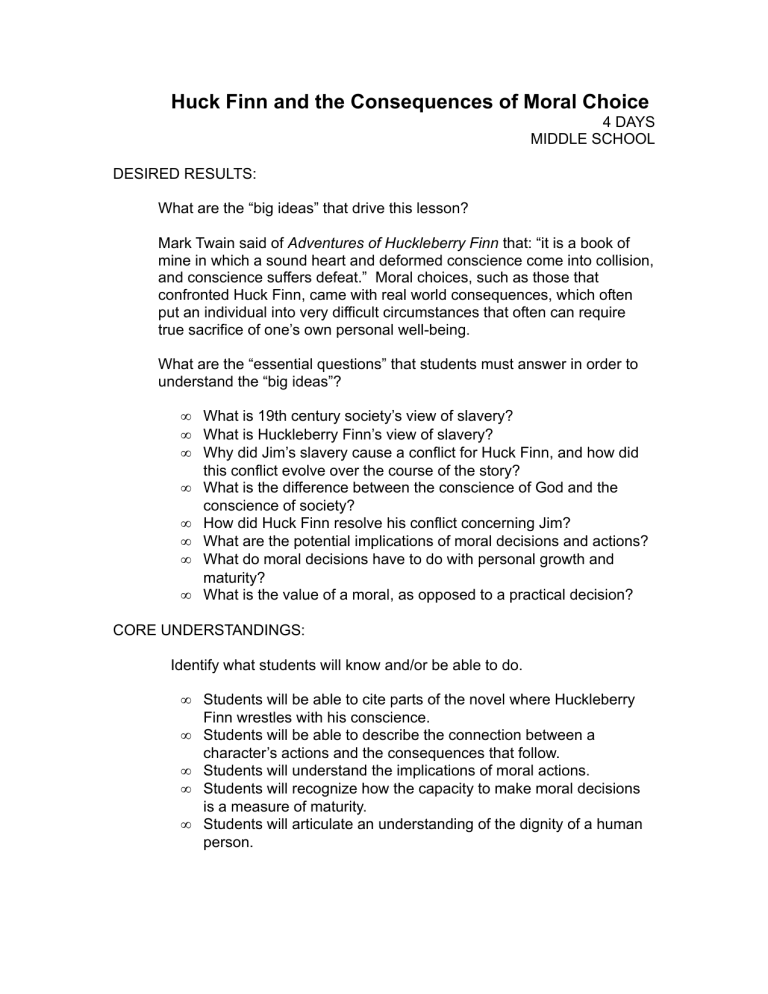
Huck Finn and the Consequences of Moral Choice
4 DAYS
MIDDLE SCHOOL
DESIRED RESULTS:
What are the “big ideas” that drive this lesson?
Mark Twain said of Adventures of Huckleberry Finn that: “it is a book of mine in which a sound heart and deformed conscience come into collision, and conscience suffers defeat.” Moral choices, such as those that confronted Huck Finn, came with real world consequences, which often put an individual into very difficult circumstances that often can require true sacrifice of one’s own personal well-being.
What are the “essential questions” that students must answer in order to understand the “big ideas”?
• What is 19th century society’s view of slavery?
• What is Huckleberry Finn’s view of slavery?
• Why did Jim’s slavery cause a conflict for Huck Finn, and how did this conflict evolve over the course of the story?
• What is the difference between the conscience of God and the conscience of society?
• How did Huck Finn resolve his conflict concerning Jim?
• What are the potential implications of moral decisions and actions?
• What do moral decisions have to do with personal growth and maturity?
• What is the value of a moral, as opposed to a practical decision?
CORE UNDERSTANDINGS:
Identify what students will know and/or be able to do.
• Students will be able to cite parts of the novel where Huckleberry
Finn wrestles with his conscience.
• Students will be able to describe the connection between a character’s actions and the consequences that follow.
• Students will understand the implications of moral actions.
• Students will recognize how the capacity to make moral decisions is a measure of maturity.
• Students will articulate an understanding of the dignity of a human person.
SUGGESTED ASSESSMENT(S):
• The final assessment of this lesson will be for students to write a written letter to Huckleberry Finn in the voice of Huck’s conscience.
The letter should follow criteria of a rubric.
LEARNING EXPERIENCES:
Day One
• Initiation: Have students brainstorm a list of their ideas on slavery.
• Introduce students to A Narrative of Fredrick Douglas to inform them about the issues of slavery.
• Have students read selected chapters and record findings about slavery in the 19 th century based on the perspective of an escaped slave.
• Identify race as a theme of the novel, Huckleberry Finn.
• Assign students reading of Huckleberry Finn in preparation for following lesson.
Day Two
• Initiation: Have students reflect on yesterday’s findings of slavery.
Discuss with students there initial thoughts of Huck’s opinion about slavery.
• Provide students with excerpts from the book that illustrate
Huckleberry Finn’s conflict with making moral choices.
o Chapter 15: Final paragraph after Huckleberry Finn plays a trick on Jim.
o Chapter 16: When Huckleberry Finn tells the men that someone on board has smallpox to cover for Jim.
o Chapter 19: Following the feud of Sheperdson and Grangerford families.
o Have students record thoughts on Huck’s decisions in a journal entry.
o Assign students reading of chapter 31 in preparation for following lesson.
Day Three
• Initiation/Hook: Present real-life situations to students where they would have to make a moral decision I. e. A friend tells you he/she is going to runaway. What do you do? Or, a law is passed that states if you do not have a high school diploma you must work as a servant for those more educated. How would you respond to this law?
• If time allows, have students role-play these situations.
• Have students read aloud the first half of chapter 31. Have students work with a partner to make a list of pros and cons (for Huckleberry) of
what would happen if Huckleberry Finn sent the letter about Jim’s whereabouts to Miss Watson.
• Have students share pros and cons and discuss moral dilemma that
Huck is feeling.
• Have students read the letter he wrote. Discuss why Huck is convinced that his reward for defying the moral norms of society will be eternal damnation. Discuss slavery in the 19 th century.
• Have students make a connection to universal religious teachings, especially those that stress the Golden Rule. Ask students what conscience Huckleberry Finn is listening to- God or society/culture?
Day Four
• Have students brainstorm ideas for performance task essay.
o Choose a side of Huck’s conscience.
o Write a friendly letter to Huckleberry Finn in the voice of his conscience to help him make a decision about what to do with
Jim, whether to send the letter to Miss Watson or not.
o The letter must follow the rubric.
o Once letters are completed students will work through the writing process to edit, revise, peer edit, conference with a teacher, and ultimately publish a final copy.
MATERIALS AND ATTACHEMTNS:
1. Essay writing rubric- see below
4 3 2 1
Creativit y/
Voice
Text
Evidenc e
Format
Gramma r/
Mechani cs
Letter is written to appropriate audience, has an appropriate tone, is focused, and demonstrates creativity.
Letter supports the side of the conscience using at least three examples from the text or from background knowledge that reflects knowledge of historical background and slavery.
Format follows that of a friendly letter.
Correct greeting, paragraph structure, and salutation is used.
There are little or no errors in punctuation, spelling, or sentence structure.
Letter is written in an appropriate tone to an appropriate audience but may not always show creativity. It may not be clear or focused at times.
Letter supports the side of the conscience using at least three examples from the text or from background knowledge that reflects knowledge of historical background and slavery.
Format follows that of a friendly letter.
There may be a minor error in structure.
There are few errors in punctuation, spelling, or sentence structure.
Tone and audience are inappropria te at times.
Lacks creativity.
Writing style is unclear and unfocused.
Letter lacks
Format somewhat follows that of a friendly letter.
There contains multiple errors in structure.
There are several errors in punctuatio n, spelling, or sentence
Tone and audience are inappropriate
. There is no evidence of creativity.
Writing is unclear and unfocused.
There is no support to justify reasoning from text or personal background.
Format does not follow that of a friendly letter.
There are many errors in punctuation, spelling, or sentence structure that
structure that make the writing difficult to
.
understand make the writing unclear and the reader unable to comprehend.


